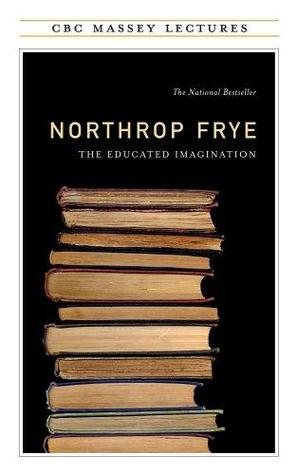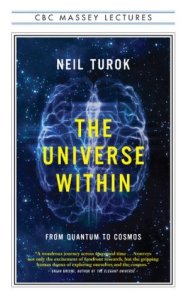The Educated Imagination by Northrop Frye

Northrop Frye was, and still remains, one of Canada’s true national treasures. He was one the most prolific academics and thinkers this country has ever seen. He was a master in so many fields, literary criticism, philosophy, Biblical scholarship, cultural criticism, and was an able observer of the visual arts. On top of this, he was a skilled writer who could succinctly make a point and disseminate obscure concepts to the general reader. His contributions to literary studies were numerous: he literally changed the paradigm in English literary criticism with his signature book, Anatomy of Criticism; he defined the overarching thematic thread in early CanLit in his conclusion to W.H. New’s History of Canadian Literature; he wrote one of the great contemporary pieces of Shakespearian scholarship with his 1986 Governor General Award winning Northrop Frye on Shakespeare; and he wrote The Great Code, a masterful book examining the influence of the Bible over every aspect of Western artistic culture. It is really impossible to overstate the contribution of Frye to Canadian culture; he really was one of the greatest Canadians.
The Educated Imagination is Frye’s 1962 contribution to the CBC Massey Lectures – only the second set delivered. Still in print, this book is a regular title you’ll see stocked in the miniature section called “Literary Studies” at your local bookstore. This is a thin book; I read the Kobo edition which was only about 160 screens, so the paper version would be around 100 pages. Despite its small size, not since Margaret Atwood’s Survival have I been so affected by a single book. This little book should be required reading for every university English major in their first week and then be re-read every year. Additionally, everyone who teaches English, from elementary school through to PhD programs should be reading this book regularly.
This series of essays attempts to answer two questions: Why study literature? And How do we best teach literature?. Frye uses his strong and fluent prose to answer these questions. He contrasts the study of literature with that of physical sciences to demonstrate the power and importance of the human imagination. The Educated Imagination looks at so many topics: different levels of imaginative communication, use of metaphor and simile, censorship and free-speech, teaching methodologies, the importance of knowing Biblical and classical stories, and the interplay of the arts, social sciences, and physical sciences.
There was nothing revelatory about this book. By that, I mean there wasn’t any new Earth-shattering notions that hadn’t crossed my mind before in the abstract. This book affected me the way it did because of how it articulated concepts and ideas that have vaguely occurred to me over my many years of academic study and general reading. Frye lays out, in clear and eloquent language, the argument for the study of literature and the arts.
Massey Lecture titles are always very engaging reads. Northrop Frye’s books are always a highly pleasurable experience. The two combined is something almost too overwhelmingly great to put into words. Ironically, this book was only Frye’s third published volume of work and his first following his seminal Anatomy of Criticism. Even this early in his career, he shows off his intellectual muscle. Now, not to sound elitist or “snobby”, but this book is not for everyone because, honestly, a lot of people will not connect with the topics or even understand them. This book is a must read though for anyone who has formally studied literature (and wondered why as we all have), anyone who writes seriously, or anyone who reads to be enlightened or to expand the intellect, not just to pass the time.
The Educated Imagination is one of the best books in that large fuzzy “non-fiction” category, and the best literary studies book, I have ever read. Full stop. Go read it.
The Universe Within by Neil Turok

Longlisted for the 2013 Charles Taylor Prize
An Amazon.ca Best Book ~ 2012
If I would have worked harder at math in high school, I would have been an astrophysicist. The cosmos fascinates me; the study of physics of attempts to answer the most fundamental question in all of existence: how did we get here? Physics and cosmology play with such fantastic ideas that it makes your head spin. Spacetime, the Big Bang singularity, black holes, quantum particles, a multiverse, 11 spacial dimensions, and imaginary numbers like the square root of negative 1 are all fascinating topics. Who hasn’t been fascinated by Schrodinger’s Cat and who hasn’t looked up who Heisenberg was after watching Breaking Bad? Neil Turok’s The Universe Within, the 2012 Massey Lecture series, is an examination of the history of physics, how physics has shaped our world, and a philosophical treatise on the power of human mind. The Universe Within, particularly the fifth and final chapter, is an epic examination of science and is a very powerful read.
Turok, a world renowned physicist, explores the development of physics through its major stages. He looks at the contributions of the Greeks like Pythagoras, Newton and the beginning of classical physics, Einstein and the physics renaissance of the early 20th century, and the current quantum revolution. Throughout this history, Turok gives insights into his own experiences as a student of physics while growing up in Africa, giving back to the continent, and what the future of science in Africa may hold. He speaks very passionately about this subject and has great hope for the developing world. His prevailing question seems to be “what would happen of all seven billion of Earth’s minds fulfilled their potential?” This is certainly a great question to ask.
I LOVE the Massey Lecture books and this was a fantastic entry, but it didn’t knock off A Short History of Progress as my favorite (but I think Wright’s book was one of the most important pieces of writing in the last half-century). Of all the Massey Lecture’s I’ve read though, Turok’s book was certainly the most thoroughly and widely researched, covering not only science but history, philosophy, and literature. My one criticism of the book is that, at certain points, maybe a total of 20 pages, Turok gets way too technical for the average reader. There were times that he was elucidating mathematical formulae that were so complicated that I kind of zoned-out. But, with that being said, with some very very complicated theories, like the singularity, inflation, quantum mechanics, and string theory, Turok did a masterful job of “dumbing-it-down,” so to speak, for us non-scientists. (I tell my wife I’m a scientist all the time, but apparently studying the literary history of small islands doesn’t make me one…in her opinion).
The last chapter of this book absolutely blew me away. If you don’t have time to sit down and read a 250 page book, buy this title, and just read the final 50 page chapter. In it, Turok discusses the coming age of quantum computing. In addition to humanity approaching the end of its supply of non-renewable resources, it seems, according to Turok, that we are 20 years away, at most, from reaching the finite maximum computing speed using existing technology (because transistors in CPUs are limited by the size of an atom, and right now they are not much larger than that now). His discussion on the development and ramifications of quantum computing were fascinating.
Turok’s primary theme is that the human mind seems to have no limits. In our short time as a civilization, we have already mapped the visible universe, discovered the Higgs Boson, and are on the brink to solving the mystery of the Big Bang. Personally, I also think we are also on the brink of “discovering” a multiverse, travelling faster than light, and finding evidence of extraterrestrial life. Within his scientific writing, Turok is very humble about his place in the world (he has an astrophysics equation named after him) and he is also somewhat critical of the wider study of science. He advocates for a return to a common 18th and 19th century practice of public scientific lectures and making scientific research a part of everyday culture and thinking, removing the disconnect between the lab and the wider-world.
Even someone with the most rudimentary understanding of science will enjoy this book. If you enjoy science and are fascinated by the universe, this is a must read. In time, I think The Universe Within will join other books like A Brief History of Time, The Elegant Universe, and Cosmos in the canon of popular-science classics.
